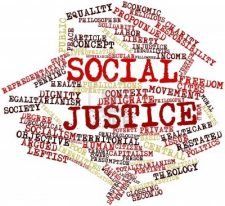 (Darrell B. Harrison – Just Thinking…For Myself) As increasing numbers of professing Christians subscribe to a gospel of social justice – a fundamental tenet of which is the resurrection and prosecution of past sins committed primarily by white evangelical Christians against black people whether by commission or omission – the term ‘evangelical Christian(ity)’ has become synonymous with historical and present-day attitudes of white oppression and white supremacy in America, whether perceived or real.
(Darrell B. Harrison – Just Thinking…For Myself) As increasing numbers of professing Christians subscribe to a gospel of social justice – a fundamental tenet of which is the resurrection and prosecution of past sins committed primarily by white evangelical Christians against black people whether by commission or omission – the term ‘evangelical Christian(ity)’ has become synonymous with historical and present-day attitudes of white oppression and white supremacy in America, whether perceived or real.
But a fundamental problem with this perspective is that it paints an entire ecclesiastical population, namely, white evangelical Christians, with a very broad and subjective brush, having judged them collectively guilty of harboring such sinful attitudes solely on the basis that they are white and evangelical.
Ironically, seldom, if ever, is the term ‘evangelical’ used in that same context when referring to Christians who are black. Unlike white evangelical Christians, black Christians are considered just, well, Christians, and under that generic descriptor are generally not held to the same standard of attitudinal or ideological scrutiny as their white evangelical brethren.
Yes, they are brethren (Gal. 3:26-28).
As is often the case when engaging in discourse on such topics as white evangelicalism and, specifically, the influence white evangelicals are having in shaping the current socio-political vista in America – a reality many social justice advocates, especially though not exclusively, find concerning – objective terms and definitions have proven difficult to come by.
But if this matter of white evangelicalism is to be discussed in a spirit of intellectual honesty, it must first be objectively defined so as to be understood in context as opposed to a subjective and nebulous idea that is open to interpretation. In other words, the question must be asked: what exactly is ‘white evangelicalism’ anyway?
There are myriad grievances being lodged under the guise of white evangelicalism, but I have yet to find an objective definition of what white evangelicalism is.
And if there is such a thing as white evangelicalism – as there surely must be given how incessantly the term is used within social justice circles – the logical deduction must be that there also exists such a thing as black evangelicalism, and Asian evangelicalism, and Hispanic evangelicalism, and Latino evangelism, and so on, until every conceivable ethnic association with the term evangelicalism has been identified (if such a thing were even possible).
Republished with permission.
HT Pulpit & Pen